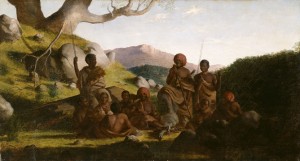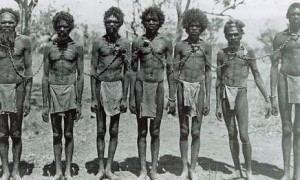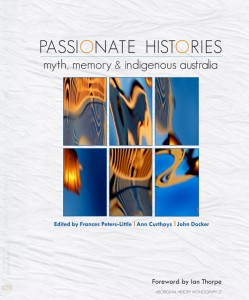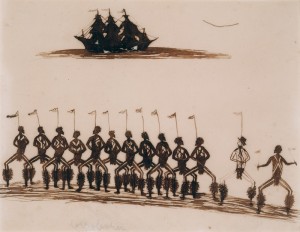
Robert Dowling/National Gallery of Victoria

Tasmania’s Black War: a tragic case of lest we remember?
Nicholas Clement, a Research Associate at the University of Tasmania writes about the importance of remembering Tasmania’s Black War on Anzac Day in Australia, urging against the general ambivalence of most Australians in confronting “the skeletons in their national closet”. His book ‘Black War’ recognises the fear and confusion felt by British and Irish convicts sent to fight natives strange to them in a harsh and unfamiliar country.
The Black War: Fear, Sex and Resistance in Tasmania – University of Queensland Press
Reviewed in The Conversation UQP ‘Black War’ cover download here….
Passionate Histories
“’Passionate Histories’ examines the emotional engagements of both Indigenous and Non-Indigenous people with Indigenous history. The contributors are a mix of Indigenous and Non-Indigenous scholars, who in different ways examine how the past lives on in the present, as myth, memory, and history. Each chapter throws fresh light on an aspect of history-making by or about Indigenous people, such as the extent of massacres on the frontier, the myth of Aboriginal male idleness, the controversy over Flynn of the Inland, the meaning of the Referendum of 1967, and the policy and practice of Indigenous child removal.”
Edited by Frances Peters-Little, Ann Curthoys and John Docker
Australian National University ANU Press Library
For the full ebook, download here
Passionate Histories Content
For the contents of this remarkable 348 page document,Passionate Histories, covering massacres in Queensland, Tasmania and Beersheba, myths of the referendum, indigenous indolence, resistance and massacres, identity, myth and memory, and the Stolen Generations, read here
John Howard (transcript from a 2001 campaign speech): “This campaign more than any other that I have been involved in, is very much about the future of the Australia we know and the Australia we love so much.
It is also about having an uncompromising view about the fundamental right of this country to protect its borders. It’s about this nation saying to the world we are a generous open hearted people taking more refugees on a per capita basis than any country except Canada. We have a proud record of welcoming people from 140 different nations. But we will decide who comes to this country and the circumstances in which they come.”
If the figures on shore watching Cook’s arrival in HMS Endeavour could have imagined what was to come, they may also have wished they could have decided who came to their country and the circumstances in which they came. Settler colonial discourse is always embedded with a belief in its loving self-righteousness, devoid of doubt : “Australia we love so much”, “uncompromising view”, “generous open hearted people”, “proud record”. Tell that to Tampa.
Australia’s Uncomfortable Black Armband
“The paper concludes that the concern with ‘hard evidence’ indicates that the massacre debate today is a microcosm of the wider debate about the impact of settler colonialism on indigenous peoples; and in particular about the humanity of the Tasmanian Aborigines. Above all it reflects the reluctance of many white Australians even today, to come to terms with incontrovertible evidence about our violent past and to seek reconciliation with Aboriginal survivors.” (Hard Evidence, Ryan)
For Lyndall Ryan’s complete commentary on the Black War , read here


